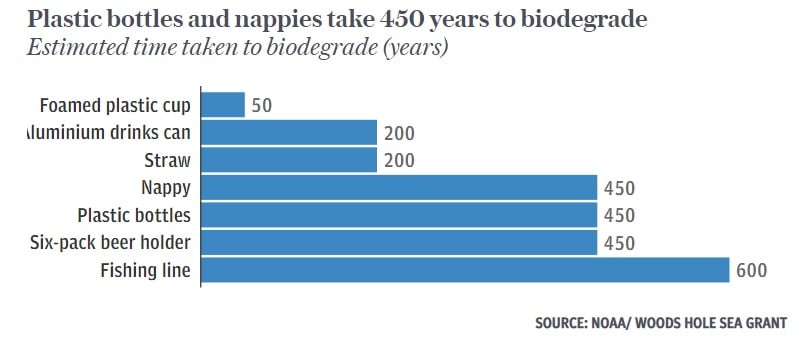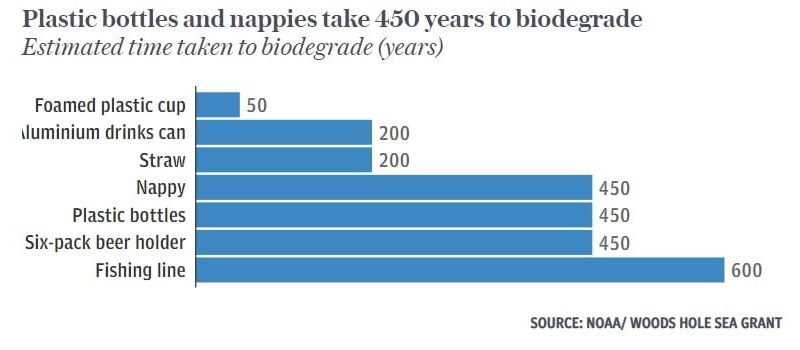How Long Does It Take For Plastic To Decompose? 🤔
Energy Disrupter
How Long Does It Take For Plastic To Decompose? 🤔: unless you have been hiding away and not reading any newspapers or websites in recent years, you will know that waste and recycling is becoming ever more important as national questions. “How long does it take for plastic to decompose?” may sound like a simple question, but it has huge impacts on government policy. This is, of course, in regards to the best way to deal with plastic waste and how to clean up our oceans.
>Download Now: Free PDF Business Owners Guide To General Waste Bin Services
We have covered plastic pollution of our seas in many blogs. In these blogs, we highlight the issues such as animal life-consuming plastic. We have even talked about the possibility of having more plastics oceans than fish happening sooner rather than later if we do not do anything!
Introducing Waster and why you should book its services
As we discuss how long it takes for plastic to decompose, we want you to know that a solution exists to control waste and keep it from endangering the environment. With that said, Waster offers other waste and recycling services.
All across Australia, you can find all sorts of waste management and recycling services providers. “How can I ensure that Waster, the waste management company with good reviews, will fulfil their services with efficiency?” Well, you will have to book and find out about our services!
Why should you pick Waster? Here are some reasons:
- You pay exactly what you asked for – and not a dollar more! For your waste management and recycling needs for your waste, avail of our flexible, 30-day contracts instead of those long, unproductive, and hidden fee-containing lock-in contracts.
- Designed for small and medium businesses – we help you reduce cost while boosting recycling. That’s a win-win situation!
- On-time and reliable – we provide fully accredited logistics and facility operators. By saying so, we ensure the safety and efficiency of our services.
Waster enables many Australian businesses to access the cheapest bin collection, removal and disposal prices there are in the Australian garbage market. A statement from our very own states that it “requires no lock-in contracts, no unjustified rate increases and no hidden costs“ and operates in all metro regions throughout Australia.
So, how long does it take for plastic to decompose?
The honest answer is that no one really knows. We can mainly attribute that to the widespread usage of plastic only beginning in the mid 20th century but hugely accelerating from then!
The UK newspaper the Telegraph explains that:
“The disposable plastic products we use every day are anything but disposable in environmental terms and can take over 400 years to biodegrade.
“The most durable plastic items, such as bottles, disposable nappies and beer holders, can take 450 years to biodegrade – over five times the average life expectancy of a British person. In terms of plastic bottles alone, the UK is generating a gargantuan amount of long-term waste by throwing away an estimated 35 million every year.”
The length of time for items to decompose varies considerably. For example, “how long does a plastic bag take to decompose?” is a very different question than how long it takes for plastic straws to decompose.
The answer is that, in every case, plastic takes a very long time indeed. And, it is greatly influenced by the environment. See the statistics below for more information.
For example, “Plastic bags are around for less time – taking about 20 years to degrade – but their impact on the environment can be equally as harmful, with plastic bags known to be eaten by a variety of marine wildlife.”


So, what does this all mean?
One of the things to remember is that pretty much all the plastic ever used – even for a short term item like a drinking straw or a plastic bag that you probably did not need – will still exist if it was not recycled. And remember, only a small percentage of global plastic has ever been recycled.
This can result in some pretty amazing finds of “time capsule plastic”. Examples of these include those of old wrappers from extinct brands, etc.
The ABC recently reported on some of the amazing finds from a cleanup performed on the Sunshine Coast. The website reports that:
“The KFC bag was discovered by a volunteer group called Sunshine Coast Clean Up Divers (SCCUD) in the Pumicestone Passage at Bulcock Beach, Caloundra, an area known for its sandy beaches and crystal clear waters.
“The group’s organiser Elliot Peters said he sent a photograph of the bag to the fast food chain, which estimated it was 30 to 40 years old, based on the logo.
“It’s hard to say [how long the bag had been there], but obviously you don’t keep a KFC bag lying around and then drop it into the water 40 years later, so it’s obviously been around in the environment somewhere, whether underwater or not,” Mr Peters said.”
Other recognisable branded objects included a 1971 Coles supermarket bag!
Again, what does this mean?
The answer as to how long it does take for plastic to decompose really makes it clear that we need real solutions to plastic usage and plastic waste. The plastic we see is only a tiny per cent of how much plastic is in the oceans. Moreover, breaking up plastic into microplastics may make the problem seem better. But truthfully, it can actually make things even worse.
Conclusion on how long it may take for plastic to decompose
It can become quite a shock when you consider how useless or short-lived most of these plastic items were – like a 1971 plastic bag, etc. – used once and still causing environmental havoc.
We, of course, have many viable solutions now. Solutions include nappy recycling that could Australia could enjoy for many years. But honestly, many of us can sense the political will from pollies and citizens. It may take quite some time for this to happen, but who knows, right?
[embedded content]
















